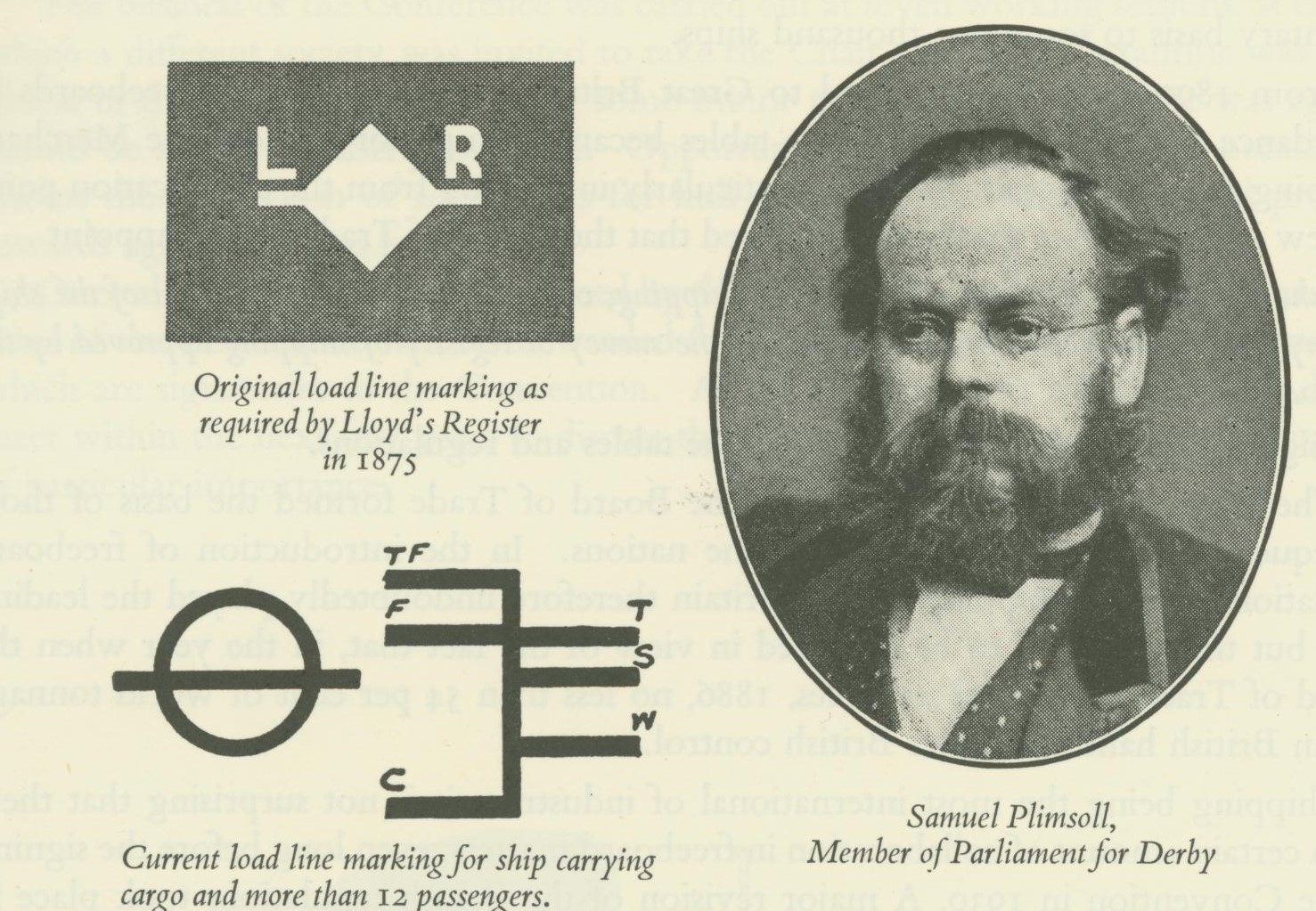Samuel Plimsoll (1824-1898) was a coal merchant and active Member of the UK Parliament, born in the port of Bristol, later becoming known for his role fighting for maritime safety.
At the time, merchant shipping was much more dangerous than it is today. As trade increased and shipping became more competitive, many owners overloaded their ships to maximise profits, which resulted in the loss of thousands of lives and ships. Despite the ‘Lloyd’s Rule’ which came into effect in 1835, stipulating that classed vessels should have three inches of freeboard for every foot depth of hold, many transatlantic ships were still overloaded due to its optional use.
Aware of growing widespread concerns about the unsafe loading of ships, together with his wife Eliza Plimsoll, Samuel campaigned strongly for the introduction of a mandatory load line, eventually resulting in The Merchant Shipping Act, 1876. This required all foreign-going vessels, coasting vessels over 80 tons and foreign ships sailing from British ports to have their deck lines and load lines marked. However, this was met with fierce opposition, and the act was misused by many as it was left to ship owners to paint the load lines themselves.
In 1890, the UK’s Board of Trade Load Line Tables declared the fixing of the position of the Load Line on all ships by law, influenced by data gathered by Lloyd’s Register surveyors. In Britain, this became known as the Plimsoll Line.

Image: Insert of Load line and Freeboard conference from the Lloyd’s Register publication, 100A1. © 100A1, 1959, Lloyd’s Register Foundation
Why is the Plimsoll story still relevant to maritime professionals today?
To mark two hundred years since the birth of Samuel Plimsoll, we spoke to Nicolette Jones, journalist, broadcaster, and author of ‘The Plimsoll Sensation', to understand why his actions are still significant today.
“For maritime safety campaigners today, ‘learning from the past’ – as encapsulated by the Lloyd’s Register Foundation initiative of the same name – is critical. Plimsoll taught subsequent reformers that public opinion is powerful. That moral issues are straightforward. That action to protect others is obligatory. And that persistence pays off.”
While it is certain that the dedication of Samuel Plimsoll has saved thousands of lives globally, overloading still occurs, with European and Canadian authorities reporting 3,197 breaches as recently as 2005. 1 Insight from Lloyd’s Register highlights that domestic ferries in some parts of the world are particularly at risk, due to loading being insufficiently regulated internally. Lloyd’s Register Foundation, in partnership with The World Maritime University, ARCSILEA, and Interferry, is working to improve the safety of domestic ferries in seven high-risk countries.
It is vital that leading organisations in the industry continue Plimsoll’s legacy, striving for a safer and more sustainable future for shipping and those who work within it. “In the maritime world, bodies such as the International Maritime Organisation and the various shipping registers have inherited Plimsoll’s mantle as guardians of the safety of seafarers, and indeed of the planet. Lloyd’s Register’s website, for example, declares its principles: ‘We care about the safety of everyone’. Samuel Plimsoll would have approved” explains Nicolette.
But it’s not just Samuel Plimsoll who deserves recognition for his invaluable contribution to maritime safety. “We tend to hear most, both in history and in the news, about individuals who change the course of events for the worse. I think it is truly important to remember lives that are landmarks in increasing the common good. I include in this Plimsoll’s wife Eliza, who was a catalyst at all significant points in his campaign for seafarers, and an equal partner in the cause. As with many women in the course of maritime history, her contribution is one that is all too often overlooked – although that is thankfully starting to change thanks to initiatives such as the ‘Rewriting Women into Maritime History’ programme being led by the Lloyd’s Register Foundation Heritage and Education Centre.
To mark 200 years since Plimsoll’s birth, Nicolette Jones spoke in more detail to Lloyd’s List and Safety4Sea bout his legacy for maritime safety today. Read the full articles below:
Lloyd’s List: ‘Plimsoll at 200: why it still matters to maritime safety’
Safety4Sea: ‘Plimsoll at 200: a maritime safety campaign that resonates today’
1. Figures supplied to Nicolette Jones by Andrew Linington of the NUMAST Telegraph [cited in The Plimsoll Sensation, p310].
Header image: Testimonial from the Sailors’ Institute in Hamburg, 1876. © DX/1110, Maritime Museum, National Museums Liverpool collections.





